
Materials Today Sustainability
Scope & Guideline
Championing high-impact research for a sustainable planet.
Introduction
Aims and Scopes
- Sustainable Materials Development:
Research on creating materials that utilize renewable resources and minimize environmental impact, including biomaterials, biocomposites, and recyclable materials. - Energy Storage and Conversion:
Exploration of materials for efficient energy storage systems, such as batteries and supercapacitors, focusing on enhancing performance and sustainability. - Environmental Remediation:
Studies aimed at developing materials for water and air purification, including photocatalysts and adsorbents to remove pollutants from various environments. - Nanotechnology and Advanced Materials:
Investigation of nanomaterials and their applications in various fields, including electronics, catalysis, and medicine, with a focus on enhancing functionality and sustainability. - Waste Valorization:
Research on converting waste materials into valuable products, including energy, fuels, and construction materials, promoting a circular economy.
Trending and Emerging
- Biomaterials and Biocomposites:
An increasing focus on materials derived from natural resources, which are biodegradable and environmentally friendly, is evident in recent publications. - Photocatalytic and Electrocatalytic Materials:
There is a growing interest in materials that facilitate photocatalytic and electrocatalytic reactions for environmental clean-up and energy conversion, reflecting a trend towards green chemistry. - Carbon-based Nanomaterials:
The development and application of carbon nanomaterials, including graphene and carbon dots, are gaining traction for their multifunctional capabilities in various fields. - Waste-to-Energy Technologies:
Research on converting waste materials into energy or valuable products is increasingly prominent, aligning with global sustainability goals. - Smart and Multifunctional Materials:
Emerging themes include the design of materials with integrated functionalities for applications in sensors, energy harvesting, and environmental remediation.
Declining or Waning
- Traditional Construction Materials:
Research related to conventional construction materials, such as standard concrete and steel, has decreased as the focus shifts towards more sustainable alternatives and innovative composites. - Non-renewable Energy Sources:
The exploration of materials for fossil fuel-based energy systems is less frequent, indicating a decline in interest as the field moves towards renewable energy solutions. - Basic Polymer Science:
Studies centered on fundamental polymer chemistry without a sustainability angle have seen reduced attention, as the emphasis is now on sustainable and biodegradable polymers.
Similar Journals
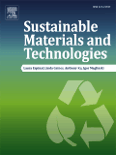
Sustainable Materials and Technologies
Empowering Research for a Sustainable WorldSustainable Materials and Technologies is an esteemed journal published by Elsevier, focusing on pioneering research and innovative solutions in the fields of industrial engineering, materials science, and environmental sustainability. With a prestigious Q1 ranking in multiple relevant categories—including Industrial and Manufacturing Engineering, Materials Science, Renewable Energy, Sustainability, and Waste Management—this journal is positioned as a leading platform for disseminating high-impact research that addresses pressing challenges in material sustainability. Recognized for its rigorous peer-review process and commitment to academic excellence, Sustainable Materials and Technologies is dedicated to providing open access to groundbreaking studies and practical methodologies that drive forward the agenda for a sustainable future. Since its inception in 2014, the journal has been integral for professionals, researchers, and students who are engaged in the quest for innovative materials and technologies that minimize ecological footprints. Join a community at the forefront of sustainability science by contributing to and engaging with the transformative research published in this pivotal journal.
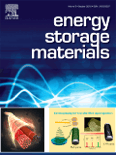
Energy Storage Materials
Shaping the future of energy through cutting-edge research.Energy Storage Materials, an esteemed journal published by Elsevier, serves as a pivotal platform for the advancement of knowledge in the vital fields of energy engineering, materials science, and sustainability. Established in 2015, it has quickly ascended to the top echelons of academic publishing, boasting an impressive Q1 ranking in categories such as Energy Engineering and Power Technology, Materials Science, and Renewable Energy, Sustainability and the Environment, all as of 2023. The journal's high impact factor underscores its significance and relevance, with Scopus rankings placing it among the elite in its domains. Through a commitment to rigorous peer review and open scientific discourse, Energy Storage Materials aims to foster innovative research and applications that address the global energy challenge. This journal is essential reading for researchers, professionals, and students dedicated to enhancing energy storage technologies and contributing to a sustainable future.
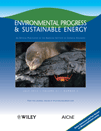
Environmental Progress & Sustainable Energy
Championing research that fuels environmental stewardship.Environmental Progress & Sustainable Energy, published by WILEY, is an influential journal dedicated to the crucial fields of environmental science and sustainable energy. Since its inception in 2009, this journal has consistently aimed to advance knowledge and understanding of innovative approaches and technologies that promote sustainability across various sectors. With an impact factor reflective of its strong academic contributions, the journal is catapulted into Q2 and Q3 quartiles across multiple categories, including Chemical Engineering and Environmental Science, demonstrating its central role in the dialogue surrounding pressing environmental issues. Researchers and professionals can access its cutting-edge studies through both traditional and open access options, facilitating the dissemination of knowledge globally. Addressed to an array of stakeholders from academia and industry alike, Environmental Progress & Sustainable Energy is not only a repository of research but also a platform for transformative ideas that aim to pave the way for a more sustainable future, making it an essential resource for those committed to the interplay of environmental stewardship and energy innovation.

Carbon Energy
Illuminating breakthroughs in energy and sustainability.Welcome to Carbon Energy, an esteemed open-access journal published by WILEY that focuses on cutting-edge research in the field of energy and materials science. Since its inception in 2019, this journal has quickly established itself as a leading platform for disseminating impactful findings and innovations related to carbon-based energy solutions, renewable resources, and sustainability practices. With its impressive Q1 rankings in multiple categories—including Energy (miscellaneous), Materials Chemistry, and Renewable Energy—Carbon Energy is recognized for delivering high-quality, peer-reviewed content that meets the rigorous standards of the academic community. Through its open-access model, the journal ensures wide accessibility of research findings, making it an invaluable resource for researchers, professionals, and students alike. As we look toward the future, Carbon Energy aims to further its mission of advancing sustainable energy technologies and promoting interdisciplinary collaboration in tackling global energy challenges.

ACS Materials Letters
Catalyzing Progress in Cutting-edge ResearchACS Materials Letters is an esteemed peer-reviewed journal published by the American Chemical Society, emphasizing groundbreaking research and advancements in the fields of materials science, biomedical engineering, and chemical engineering. With a robust update and established reputation since its inception in 2019, this journal has rapidly ascended to the top tiers, achieving Q1 rankings in key categories such as Biomedical Engineering, Chemical Engineering (miscellaneous), and Materials Science (miscellaneous) in 2023. The journal boasts impressive Scopus rankings, including #14 in General Chemical Engineering and #19 in Biomedical Engineering, placing it among the elite publications in these domains. While not fully open access, ACS Materials Letters facilitates the dissemination of high-impact research accessible to academics and industry professionals alike. With its comprehensive scope and rigorous selection process, the journal serves as a vital resource for researchers and students eager to stay abreast of the latest innovations and technologies shaping materials science and engineering.
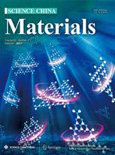
Science China-Materials
Empowering Discovery in Materials Science.Science China-Materials is an esteemed peer-reviewed journal dedicated to advancing the field of materials science, published by SCIENCE PRESS. With a strong focus on innovative research and applications, this journal provides an essential platform for disseminating groundbreaking findings in materials development, characterization, and engineering. Since its inception, Science China-Materials has achieved an impressive Q1 ranking in the Materials Science (miscellaneous) category, reflecting its commitment to quality and the impact of its publications, as indicated by its 86th percentile ranking in Scopus. The journal is set to converge its contributions from 2016 to 2024, making it a vital resource for researchers and professionals interested in the latest advancements and trends in materials science. As an open access publication, it ensures that knowledge is freely available to a global audience, promoting collaboration and innovation across disciplines. The journal is headquartered in Beijing, China, and continues to attract high-quality submissions from leading experts in the field.
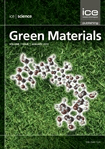
Green Materials
Pioneering research at the intersection of sustainability and materials.Green Materials, published by Emerald Group Publishing Ltd, serves as a crucial platform for research within the realm of sustainable materials science. Since its inception in 2013, this journal has focused on addressing pressing global challenges, particularly in Materials Chemistry, Pollution, and Polymers and Plastics, as evidenced by its rankings within the Q3 Quartiles. With a commitment to high-quality, peer-reviewed content, it caters to an audience keen on innovative solutions that promote environmental sustainability. Researchers and professionals can access a wealth of knowledge and insights that are instrumental in advancing the field, despite the absence of an open-access option. As the journal continues to converge towards its projected endpoint in 2024, it remains a vital resource for those dedicated to exploring the intersection of materials science and ecological responsibility, ensuring its relevance in academic discussions and practical applications.

Accounts of Materials Research
Empowering researchers with cutting-edge insights.Accounts of Materials Research is a premier journal published by the American Chemical Society, focusing on the multidimensional field of materials science. With a robust impact factor and a commitment to open-access research, it serves as a vital platform for leading-edge discoveries from 2020 to 2024. The journal has rapidly ascended to the top quartile in multiple categories, including Chemical Engineering, Materials Chemistry, and Polymers and Plastics, demonstrating its significant influence within the academic community. Recognized by Scopus as a key resource—with remarkable rankings that place it in the 95th percentile of its field—Accounts of Materials Research is devoted to publishing high-quality, innovative research that addresses critical challenges in materials development and implementation. This journal is essential for researchers, professionals, and students seeking to stay informed about the latest advancements and collaborative opportunities within the interdisciplinary landscape of materials science.
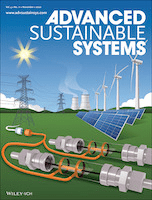
Advanced Sustainable Systems
Driving Change Through Groundbreaking ResearchAdvanced Sustainable Systems is a premier academic journal published by WILEY-V C H VERLAG GMBH, dedicated to the dynamic fields of environmental science and renewable energy. With an ISSN of 2366-7486, this journal has rapidly established its significance within the scientific community, achieving a prestigious Q1 ranking in both Environmental Science (miscellaneous) and Renewable Energy, Sustainability and the Environment categories as of 2023. Spanning the converged years from 2017 to 2024, it serves as a vital platform for researchers and practitioners alike, facilitating the dissemination of innovative ideas and groundbreaking research that drive sustainability initiatives globally. Although not an Open Access publication, its contributions are invaluable, reflected by its commendable Scopus rankings—#28 out of 233 in General Environmental Science and #49 out of 270 in Renewable Energy. As we face pressing environmental challenges, Advanced Sustainable Systems remains at the forefront, championing research that informs and influences sustainable practices and policies across the globe.

Materials Futures
Pioneering insights in biomaterials for a sustainable tomorrow.Materials Futures, an esteemed journal published by IOP Publishing Ltd, stands out as a pivotal resource in the field of Materials Science, with a particular emphasis on Biomaterials. Launched in 2022 and operating under an Open Access model, the journal aims to foster accessibility and rapid dissemination of pioneering research, thus catering to the diverse needs of researchers, professionals, and students globally. With a commendable Scopus Rank of #46 out of 137 in its category, placing it in the 66th percentile, and recognized as a Q1 journal as of 2023, Materials Futures provides a vital platform for cutting-edge studies and innovations that address contemporary challenges in materials science. As the journal evolves through its convergence period from 2022 to 2024, it continues to attract high-quality submissions aimed at advancing knowledge and applications within the biomaterials sector, reflecting its commitment to contributing vital insights and fostering collaboration across disciplines. Explore Materials Futures for your research endeavors and join a community dedicated to shaping the future of materials.